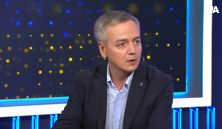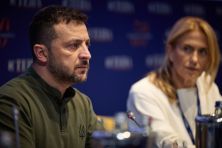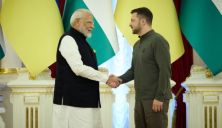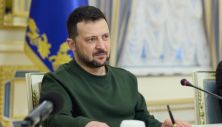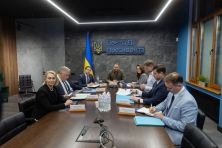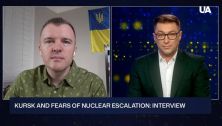Good evening, Italy! And thank you for supporting our country and our people. We appreciate every step in support of Ukraine – every action and...
Vous n'êtes pas connecté
- English
- Français
- عربي
- Español
- Deutsch
- Português
- русский язык
- Català
- Italiano
- Nederlands, Vlaams
- Norsk
- فارسی
- বাংলা
- اردو
- Azərbaycan dili
- Bahasa Indonesia
- Հայերեն
- Ελληνικά
- Bosanski jezik
- українська мова
- Íslenska
- Türkmen, Түркмен
- Türkçe
- Shqip
- Eesti keel
- magyar
- Қазақ тілі
- Kalaallisut ; kalaallit oqaasii
- Lietuvių kalba
- Latviešu valoda
- македонски јазик
- Монгол
- Bahasa Melayu ; بهاس ملايو
- ဗမာစာ
- Slovenščina
- тоҷикӣ ; toğikī ; تاجیکی
- ไทย
- O'zbek ; Ўзбек ; أۇزبېك
- Tiếng Việt
- ភាសាខ្មែរ
- རྫོང་ཁ
- Soomaaliga ; af Soomaali
Rubriques :
 Maroc - ENG.UATV.UA - A La Une - 25/Aug 17:16
Maroc - ENG.UATV.UA - A La Une - 25/Aug 17:16
We need to redesign the whole system UN Security Council, – an interview with Alexander Khara
What are the biggest challenges facing Ukrainian diplomacy during the Russian-Ukrainian war? Is Russia ready for negotiations? What is the role of the first Peace Summit in Ukrainian diplomacy? What is wrong with the UN today? These and many other questions were asked by host Anna Nytchenko to foreign policy and security expert, Deputy Chair of the Black Sea Institute of Strategic Studies, Alexander Khara. — Thank you for joining us. In your opinion, what are the biggest challenges facing Ukrainian diplomacy during the full-scale Russian invasion? — First and foremost, it's about consolidating our partners' support for Ukraine on the battlefield. I'm not referring to putting boots on the ground, but Ukraine urgently needs weapons, munitions, and other forms of assistance. Secondly, economic and humanitarian aid to civilians is critical. Given Russia's efforts to destroy Ukraine's civilian infrastructure, including energy systems and healthcare facilities, the support from our partners to rebuild and strengthen our resilience is invaluable. Ukrainian diplomats are heavily focused on securing this aid. Another crucial task for our diplomats is working towards a just and lasting peace in Ukraine. Currently, there's no willingness from the Kremlin to stop the war or agree to the principles enshrined in the UN Charter and the OSCE Final Act, such as sovereignty, independence, and non-violence. Our diplomats are striving to find a diplomatic solution to the conflict with Russia and to secure Ukraine's future within the family of European nations. — There's a saying that war begins when diplomacy ends. Was there any way to prevent a full-scale invasion, perhaps through negotiations? — Absolutely. If Ukraine had joined NATO back in the 1990s or at least after the Orange Revolution in 2004, Russia would likely have hesitated to attack a NATO member. However, there was little chance of avoiding this war through negotiations with Russia. We've been trying to negotiate our borders for years. In 1997, we signed an agreement where Russia agreed to respect our borders, yet they violated this in 2014 by illegally annexing Crimea and starting a proxy war in the Donbas. Russia still harbors imperial ambitions, seeking to expand its influence over former Soviet republics. While countries fortunate enough to be part of NATO, like the Baltic states, Poland, and Romania, are protected, Ukraine wasn't. This isn't just a failure of Ukrainian diplomacy but also a reflection of the Ukrainian society at the time, where NATO wasn't as popular as the European Union due to lingering Soviet-era stereotypes. Diplomacy can help avoid war, but mostly by integrating into the family of free nations under NATO's umbrella rather than by appeasing Russia's growing demands, which would only erode Ukrainian sovereignty. — Speaking of Ukrainian diplomatic efforts, a peace summit was held in Switzerland this year, and a second one is planned. From a diplomatic standpoint, how important are these events, and how challenging was it to organize them? — Organizing the summit was indeed a challenge. Not only did Russia attempt to disrupt it, but their allies, like China, also tried to dissuade countries from participating or signing the final communique. When it comes to peace plans, there is really only one—the Ukrainian plan, which is based on international law and principles. Other proposals, like the Chinese plan, do not guarantee the restoration of international law or Ukraine's sovereignty and territorial integrity. Instead, they aim to stop the war without addressing the root causes, allowing Russia to maintain influence in European affairs. China has abstained from key UN votes that would have condemned Russia's actions, such as during the annexation of Crimea in 2014 and the full-scale invasion in 2022. They also refrained from supporting the resolution for a just and lasting peace in Ukraine. While China isn't providing military aid to Russia, they are supporting them economically and diplomatically. So, yes, organizing such a summit was difficult, but necessary to rally international support behind a peace plan that truly respects Ukraine's sovereignty. — Despite the challenges, more countries are signing the final communique of the summit. Is this a success of Ukrainian diplomacy? — Yes, it's a testament to the work of Ukrainian diplomacy and the efforts of our partners. We're not alone in this struggle. We have a coalition of countries not only supplying us with weapons and ammunition but also providing diplomatic support. They're engaging the global community, especially the Global South, to side with international law rather than supporting an aggressor waging a genocidal war in Ukraine. — One of the significant achievements of Ukrainian diplomacy this year is the opening of embassies in African countries. Could you explain to our viewers why this is so important? — Global power dynamics are shifting towards Asia and the Global South, particularly African countries. These regions are becoming increasingly influential, and in the UN system, every sovereign country has a voice that can impact global decisions. From the beginning of the war, especially when Russia blockaded our Black Sea ports, African countries were among the hardest hit by food shortages and rising prices. It's in their interest, and ours, to stop this war and restore Ukraine's territorial integrity so we can resume exporting food supplies. To achieve this, we need diplomatic representation in these countries. We also need greater engagement from our African partners, who shouldn't stand by idly as this conflict could potentially escalate into a global crisis. Moreover, Ukraine is fighting a major nuclear power. If we fail to defend ourselves, it sends a dangerous message that nuclear-armed nations can act with impunity. This could encourage other nuclear threshold states to consider aggressive actions, leading to even more instability. — Many countries in Africa and Asia are reluctant to support Ukraine because they don't want to align with nations that were once their colonizers. How can we explain to them that Russia is a colonizer of Ukraine? — It's a challenge, but we need to tell our story. Despite our appearance, Ukrainians were also colonized by Moscow. During the Soviet era, Ukraine supported liberation movements in Africa and Asia. Ukrainians aren't racists or xenophobes. We welcomed students from these regions, and today, we have over 140 nationalities living peacefully in Ukraine. We even have an African-Ukrainian member in our parliament, which reflects our inclusivity. Ukraine never had colonial ambitions, and we still don't. We believe in equality and fairness, which is why we expect other nations to judge us based on our actions and history, rather than outdated stereotypes. — Regarding international organizations like the United Nations, how can we make them more effective in protecting Ukraine? — It's a tough question. The UN has struggled with efficiency since its inception, and now it’s failing to fulfill its core mission as envisioned after World War II. The system needs reform, particularly the Security Council, where the current structure allows Russia, still recognized as the Soviet Union's successor, to block any meaningful resolution regarding its own aggression. To avoid repeating the mistakes of the League of Nations, we need to redesign the Security Council to better represent the global community and ensure that no single nation can unilaterally block actions against aggression. It's a complex issue, but necessary to prevent a global conflict and maintain peace. — And one more question. If we are talking about the United Nations and other international partner organizations, how can international organizations work and protect Ukraine? Interviewee: Ever since the United Nations was established, there were talks about improving efficiency, and now we see the United Nations failing in its main goals that were envisaged by the winning powers after the Second World War. It’s a difficult question because we have rivalry and see ambitions of some countries who are not willing to be included in this exclusive club of permanent members of the Security Council—some nations like Germany, Japan, or others from the global South. But I believe that the threat of global conflict should guide people and push them to find a compromise. The League of Nations failed to stop the war, and we had the Second World War. The United Nations needs to avoid repeating this bitter mistake. We need to avoid global conflict and provide rising nations with opportunities to take decisions for the whole world. There should be equal and fair representation of different regions. Certainly, there should be no veto power on issues like aggression. If you look at the UN Charter Soviet Union is still a permanent member of the United Nations and the Security Council, but Russia is not. Nevertheless, Russia commits genocide in Ukraine. It started its aggression against Ukraine back in 2014 and in 2022, but we cannot do anything because it blocks any solution to this conflict. It possesses veto power. So, we need to redesign the whole system of the Security Council and get more representation from other nations. https://www.youtube.com/watch?v=NBAI4hF4xEE Read also: How to expose Russian fakes? – Interview with Andriy Kulish. The post We need to redesign the whole system UN Security Council, – an interview with Alexander Khara appeared first on Freedom.
Articles similaires
Ukraine is not asking for anything more than what your country or any other country already has – speech by the Zelenskyy at the 50th Ambrosetti International Forum
Good evening, Italy! And thank you for supporting our country and our people. We appreciate every step in support of Ukraine – every action and...
India’s Neutral Moves in Geopolitics will End. Interview with Oleksandr Sushko
Indian Prime Minister Narendra Modi discussed the situation in Ukraine by phone with the President of the United States, Joe Biden. He also had a...
The Regime’s Wars Are Built On Lies – OpEd
By Karen Kwiatkowski Americans are increasingly uneasy about their “national” security, and increasingly concerned that war is lapping at our...
The Regime’s Wars Are Built On Lies – OpEd
By Karen Kwiatkowski Americans are increasingly uneasy about their “national” security, and increasingly concerned that war is lapping at our...
Putin’s Mediation Proposal: Can China, Brazil, And India Navigate The Ukraine Crisis? – Analysis
Introduction In a significant diplomatic move, Russian President Vladimir Putin has put forward a proposal to address the protracted conflict in...
Kursk operation: Zelenskyy explains how long Ukraine will keep Russian territory under its control
President Volodymyr Zelenskyy said that Ukraine will keep part of the Kursk region under its control as part of the plan to win the war. He said...
The Second Thematic Conference in the wake of the Peace Summit was held on the Food Security
Head of the Presidential Office Andriy Yermak took part in a thematic conference on the implementation of the agreements reached at the Global Peace...
Russia’s Growing Soft Power With Africa – Interview
In this interview with Armen Khachatryan, Deputy Chief Executive Officer and Programme Director at the Roscongress Foundation, and now a member of...
Kursk and fears of nuclear escalation. Interview with Jake Broe
What is the impact of Kursk operation? Is there any risk of nuclear escalation? Why hasn't Putin been defeated yet? Why aren't there more weapons...
Les derniers communiqués
-
Aucun élément
